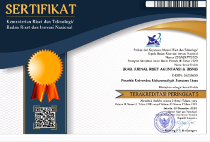Pengaruh Kebijakan Moneter Terhadap Kinerja Bisnis Perbankan Syariah
Abstract
Keywords
Full Text:
PDFReferences
Ali, A. O. (2021). Impact of Monetary Policy Fluctuations on Conventional and Islamic Banks in Malaysia: Evidence From Ardl Approach. International Journal of Economics and Financial Issues, 11(1), 101108. https://doi.org/10.32479/ijefi.9210
Anshori, M., & Shofiyudin, M. A. (2021). Peran Kebijakan Moneter Terhadap Kemampuan Perbankan Dalam Penyaluran Pembiayaan. Jurnal Ilmiah Ekonomi Islam, 7(1), 51. https://doi.org/10.29040/jiei.v7i1.1758
Arumingtyas, F., & Muliati, L. (2019). Apakah Inflasi dan Suku Bunga Memengaruhi Profitabilitas Bank Umum Syariah di Indonesia? Jurnal Akuntansi Dan Keuangan Syariah, 7(2), 143160.
Basu, R., Prasad, A., & Rodriguez, S. (2015). Monetary Operations and Islamic Banking in the GCC: Challenges and Options. IMF Working Papers, 15(234), 1. https://doi.org/10.5089/9781513588513.001
Bidabad, B. (2019). Islamic Monetary Policy and Rastin Swap Bonds. International Journal of Islamic Banking and Finance Research, 3(2), 116. https://doi.org/10.46281/ijibfr.v3i2.269
Hamid, F. S., & Yunus, N. M. (2020). Bank-Lending Channel of Monetary Policy Transmission: Evidence from ASEAN. Global Business Review, 21(4), 892905. https://doi.org/10.1177/0972150919856959
Hamza, H., & Saadaoui, Z. (2018). Monetary transmission through the debt financing channel of Islamic banks: Does PSIA play a role? Research in International Business and Finance, 45(August 2017), 557570. https://doi.org/10.1016/j.ribaf.2017.09.004
Hassan, M. A. R. S. dan A. R. dan M. K. (2020). On the Role of Islamic and Conventional Banks in the Monetary Policy Transmission in Malaysia: Do Bank Size and Liquidity Matter? Research in International Business and Finance, 2019, 132. https://doi.org/10.1016/j.jhazmat.2020.124285
Hoque, M. A., Ahmad, A., Chowdhury, M. M., & Shahidullah, M. (2020). Impact of Monetary Policy on Banks Profitability: A Study on Listed Commercial Banks in Bangladesh. International Journal of Accounting & Finance Review, 5(2), 7279. https://doi.org/10.46281/ijafr.v5i2.796
Hossain, B. (2020). Islamization of Monetary Policy of 27 OIC Muslim Countries in Asia: The Successes, The Barriers and The Future Directions. Global Review of Islamic Economics and Business, 7(2), 091. https://doi.org/10.14421/grieb.2019.072-04
Kholik Khoeruloh, A., Priyanti, G., Sri Astuti Sya, N., Amirudin, A., Islam, E., UIN Sunan Gunung Djati Bandung, P., Muhammadiyah, S., Dhuafa Jawa Barat, D., & STMY Majalengka, S. (2020). Inflasi Dan Bi 7-Day Repo Rate: Faktor Penentu Profitabilitas Bank Umum Syariah Di Indonesia Inflation And Bi 7-Day Repo Rate: The Determining Factor In The Profitability Of Sharia Commercial Banks In Indonesia. 3(1), 3747. http://jurnal.unma.ac.id/index.php/mr/index
Naroh Kawiryawan, M. I. H. (2015). Pengaruh Tingkat Return Sertifikat Bank Indonesia Syariah (SBIS) Terhadap Penempatan Dana pada SBIS dan ROA Bank Umum Syariah di Indonesia. Jurnal Ekonomi Syariah Teori Dan Terapan (JESTT), 2(11 November 2015), 881895. https://doi.org/10.20473/vol2iss201511pp881-895
Rafay, A., & Farid, S. (2019). Islamic banking system: a credit channel of monetary policyevidence from an emerging economy. Economic Research-Ekonomska Istrazivanja , 32(1), 742754. https://doi.org/10.1080/1331677X.2019.1579662
Shah, S. M. A. R. dan A. R. (2019). the Credit Supply Channel of Monetary Policy Transmission Mechanism: an Empirical Investigation of Islamic Banks in Pakistan Versus Malaysia. Journal of Islamic Monetary Economics and Finance, 5(1), 2136. https://doi.org/10.21098/jimf.v5i1.1046
Sri Herianingrum, U. M. F. (2016). ANALISIS MEKANISME TRANSMISI MONETER JALUR PEMBIAYAAN BAGI HASIL DI INDONESIA. Jurnal Ekonomi Dan Bisnis Islam, 2(2), 125148.
Sriyono. (2016). PENGARUH VARIABEL-VARIABEL MONETER TERHADAP KINERJA PERBANKAN ISLAM : UKURAN PERUSAHAAN SEBAGAI VARIABEL MODERAT. Majalah Ekonomi Telaah Manajemen, Akuntansi Dan Bisnis, XXI(1 Juli 2016).
Susi Indriani & Priyanto, S. I. T. (2018). Dampak Perubahan Suku Bunga Kebijakan dan Inflasi Terhadap Portofolio Pembiayaan Perbankan Syariah. Jurnal Riset Terapan Akuntansi, 2(1 Januari 2018), 91100.
Warin, T. (2014). Monetary Policy : From Theory to Practices Monetary Policy : From Theory to Practices by Thierry Warin. July 2005.
Yungucu, B., & Saiti, B. (2016). The effects of monetary policy on the Islamic financial services industry. Qualitative Research in Financial Markets, 8(3), 218228. https://doi.org/10.1108/QRFM-02-2016-0006
Zulkhibri, M. (2018). The impact of monetary policy on Islamic bank financing: bank-level evidence from Malaysia. Journal of Economics, Finance and Administrative Science, 23(46), 306322. https://doi.org/10.1108/JEFAS-01-2018-0011
DOI: https://doi.org/10.30596/jrab.v21i2.7682




